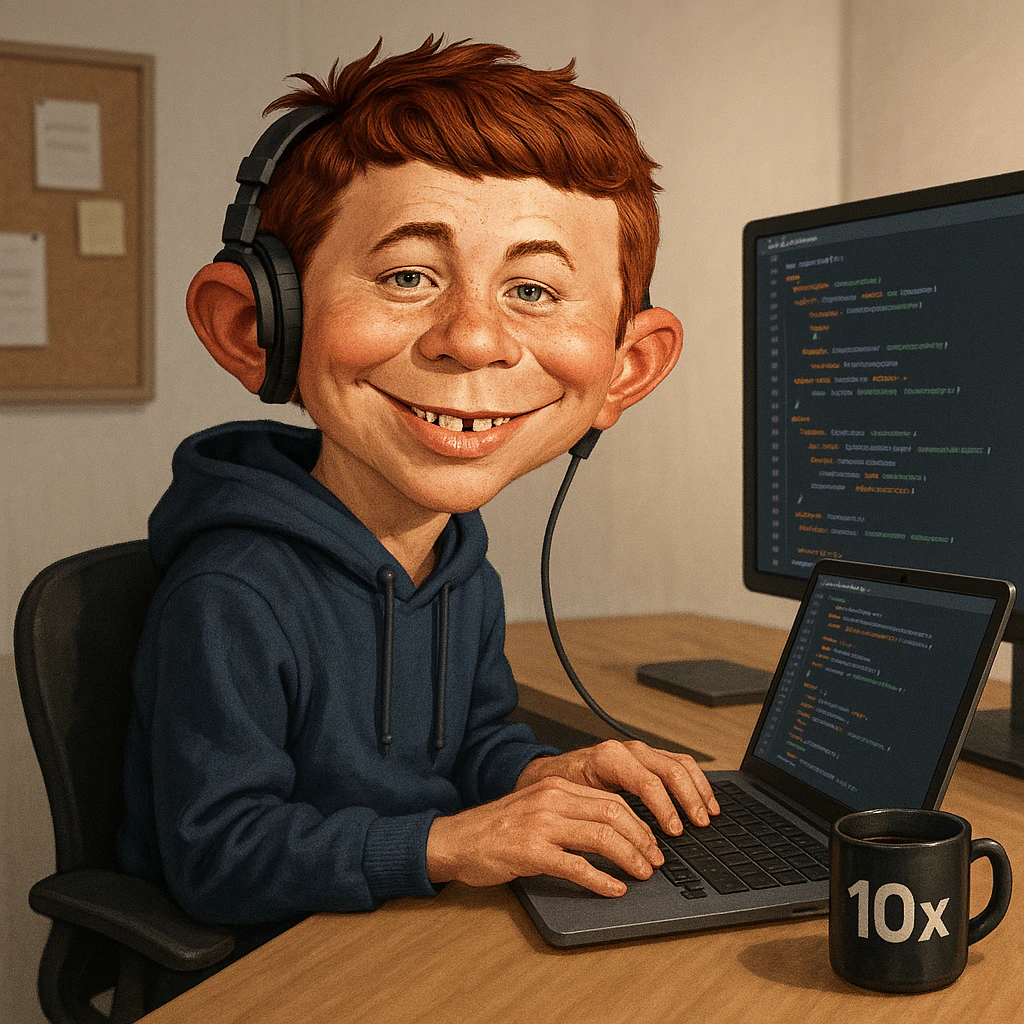Google Gemini 2.0’s idea of a “10x developer” in March 2025. (Hey, I count 10 fingers!)
After using AI daily to help build this blog, here’s what I’ve learned.
I’ve made a career out of coding for 40+ years. AI is impressive, but it’s not a replacement. It’s a tool—useful, flawed, and easily misunderstood.
It Doesn’t Save Time—It Just Shifts the Work
AI might spit out code fast, but the time you “save” often gets eaten up by debugging, refining, or recovering from some dead-end it took you down. Sometimes it nails it. Other times, it sends you on a goose chase. On average? It’s a wash.
You still have to think. You still need to know what you’re doing.
AI Is a Tool, Not a Replacement
AI is like a power tool. In skilled hands, it’s fantastic. In the hands of a beginner? Dangerous or, at best, mediocre.
The idea that AI can replace experienced developers is nonsense. It can scaffold a basic app. It can write a for loop. But it can’t architect, optimize, or understand the big picture—yet. A seasoned developer, with AI tools as a superpower, still delivers better results, faster, and with fewer bugs.
Even AI agrees:
“AI can be an incredibly helpful tool… but it doesn’t replace the critical thinking, creativity, and problem-solving skills that a skilled programmer brings to the table.”—ChatGPT
Exactly.
Human Becomes Your Safeguard
Who’s going to double-check when AI suggests installing a malicious slopsquatted package, library, or plugin? Now that this attack vector is real, any recommendation—legit or not—should raise suspicion. You can’t fully trust the AI, and you definitely can’t trust the supply chain blindly.
That’s where a skilled developer comes in. They need to be able to read and evaluate third-party code for red flags. Yes, you can throw it back to the AI for review, but thoughtful, security-minded analysis isn’t something you can expect from junior coders—or from AI without oversight.
The Skilled Get Stronger
AI can amplify your skillset—if you already know what you’re doing. You’ll spot what it misses, tighten things up, and feed it smarter prompts. You’ll get better, not worse.
But if you don’t take the time to understand the code it generates, you’re just stacking complexity you don’t fully grasp. That’s a disaster waiting to happen.
I’ve learned new things by wrestling with AI code and improving it. I’ve even taught it a few things along the way. That’s when AI becomes a force multiplier.
AI Raises the Bar, But Doesn’t Move It
AI gives beginners a boost, sure. But that just moves the starting line. Expectations rise. Companies won’t settle for “almost good enough” forever.
If quality, speed, and user experience matter—and they usually do—then the work of professionals who understand their tools will stand out. As always, you get what you pay for.
Teams + AI = Better Output (If Done Right)
AI can be like a virtual pair programmer—always ready, always fast. That’s useful. You might not replace a developer with it, but you can double their output if they use it well.
But too many businesses think it’s a magic budget-cutting tool. Fire the senior devs, keep the juniors, and let AI fill the gaps. Problem is, AI doesn’t know your company, your stack, or your legacy code. The people walking out the door do.
Good luck replacing that.
Final Thought: It Depends
Does AI save time? Maybe. Save money? Sometimes. Deliver better results? Only in skilled hands.
The real value of AI shows up when it’s used by people who already know what they’re doing. They use it to create better solutions faster. Everyone else is just hoping it’ll cover their weaknesses.
What, Me Worry?
ChatGPT’s idea of a “10x developer” in April, 2025
Sure, you could try to replace me with AI. But that would be mad. Unless the AI can also create a better developer—you’re not saving time, money, or sanity.
Frankly, employers, let’s be honest: if you had better people to start with, they’d already know how to use all the tools properly. AI is just one arrow among many in a good programmer’s quiver.

